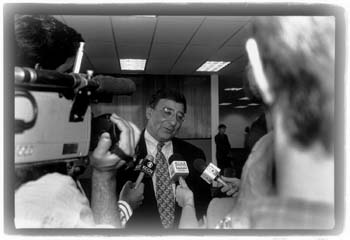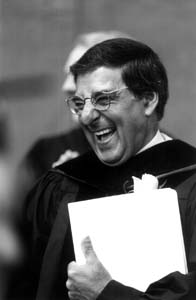![[MetroActive News&Issues]](/gifs/news468.gif)
![[MetroActive News&Issues]](/gifs/news468.gif)
[ Metro Santa Cruz | MetroActive Central | Archives ]
The Non-Candidate
No Comment: Former Central Coast congressmember and Clinton administration chief of staff Leon Panetta won't say yet whether he'll run for governor in 1998.
Leon Panetta's years of experience in Congress and the White House may not be enough to land him in the governor's mansion
By Jill Duman
AFTER 16 YEARS OF REPUBLICAN rule in the state's highest office, the political tide could turn next year. Analysts nationwide say 1998 could see the election of California's first Democratic governor in four terms. However, the pundits agree that Democrat probably won't be former Central Coast congressmember and Clinton chief of staff Leon Panetta.
A host of Sacramento-watchers and campaign veterans say Panetta's decision will probably have a lot to do with whether U.S. Sen. Dianne Feinstein enters the race. Feinstein is a formidable political veteran who has already run several statewide races. And a growing consensus says she will probably throw her hat in the ring.
Gary Patton, a former Santa Cruz County supervisor and candidate for state Assembly who now serves as legal counsel for the Planning and Conservation League in Sacramento, speaks very highly of Panetta. But he says this could be Feinstein's year.
"She has got incredible name recognition, she's a great fundraiser, she has had very significant exposure on the national level as a senator, and I think she would just be a very strong candidate," Patton says.
Dan Haifley, former chief of staff for retired state Senate Majority Leader Henry Mello, also says Panetta's fate rests in Feinstein's hands.
"Leon Panetta is at the top of his game right now, but so is Dianne Feinstein," Haifley says. "The two are friends, and they will not run against each other.
"I will bet the farm that Leon runs if Dianne Feinstein doesn't. But I think Dianne Feinstein has every reason to run."
John Laird, chair of the Santa Cruz County Democratic Party, agrees that Panetta's decision will be largely based on Feinstein's next move.
"I don't think he will [run] if she will," Laird says, "and I think she's leaning toward running."
Sacramento Bee political columnist Dan Walters concurs.
Panetta "may run, but only if Di Fi doesn't," says Walters, who--in a column three weeks ago--urged the state's Democratic voters to "persuade Dianne Feinstein to run next year or kiss the governorship goodbye."
While Panetta has never run for statewide office, Feinstein has run three statewide races: an unsuccessful bid for governor in 1990 against Republican Pete Wilson, and two winning races for the Senate--in 1992 against Wilson appointee John Seymour, and in 1994 against millionaire Michael Huffington.
Political watchers say that could give her an edge on Dan Lungren, the conservative state attorney general who is so far the sole gubernatorial contender on the Republican side of the ticket.
A Field Poll of 724 registered Democrats released on May 21 showed Feinstein topping Lungren by 6 percentage points. The same poll showed Lungren defeating Panetta by 4 points in a match-up between the two.
Kam Kuwata, who served as campaign manager for Feinstein's 1992 and 1994 races, says that as a personal friend of the senator, he knows she "doesn't feel any immediate need" to make up her mind.
Still, he says her legislative support of issues ranging from a ban on the sale of automatic weapons to the Desert Protection Act, which created two national parks out of 3 million acres of desert land, "make me believe she is the strongest candidate to become governor of California. She's on target with the mainstream on a lot of different issues," Kuwata says.
Photo by Billy Wetlegs
The Name Game
EVEN IF FEINSTEIN'S run keeps Panetta out of the race, she won't be the only Democrat battling it out in the June 1998 primary. Lt. Gov. Gray Davis, who got his political start as chief of staff for Gov. Jerry Brown, has formed a committee, raised close to $4 million and announced his intention to run--regardless of who else gets into the race. (Davis was the only other Democratic contender besides Feinstein who was shown leading Lungren in the May 21 Field Poll.)
Al Checchi, the former co-chair and major stockholder of Northwest Airlines, has also formed a committee to explore the possibility of running, a prospect he has said he is willing to back with $30 million of his own money.
State Controller Kathleen Connell is another possible Democratic contender whose political currency as a woman could increase should Feinstein decide not to run.
But according to Kuwata, none of that competition is likely to have any bearing on Feinstein's strength as a candidate.
"I fully expect there will be one, two, three, perhaps four other candidates who will want to take a shot," Kuwata says. "None of those will weigh in on any decision."
Others say that what might dissuade Feinstein is the prospect of going up against a millionaire candidate so soon after her bruising race against Huffington--a race that saw Feinstein spending $14.5 million to Huffington's $29.9 million, and then barely squeaking through the finish line ahead by 162,000 votes.
"If someone like Al Checchi has $30 million to put into the race, he will be more well-known than someone who had held 25 offices," says Cathy Calfo, a Santa Cruz political consultant currently working on Phil Angelides' race for state treasurer.
"With Checchi in the race, anyone in their right mind has got to be thinking of that," she says.
Politically, Feinstein and Panetta share a common ground that would likely encompass a broad range of support from both moderates and traditional liberal Democrats in a match-up against Lungren, a Republican considerably to the right of Gov. Pete Wilson.
Panetta, who represented the environmentally conscious Central Coast for 16 years as a U.S. Congress member and who has an extensive civil rights record (he served in 1969 as director for the U.S. Office of Civil Rights), does come across as stronger on some fundamental liberal principles than Feinstein. Nevertheless, the two are not far apart ideologically. That's another reason, politicos say, the two won't run against each other.
It's also added fodder to a rumor which holds that Feinstein may, if she wins the gubernatorial race, appoint Panetta to finish out her senate term--a move that would give Panetta a boost should he be considering a run for that office in the year 2000.
"We haven't cut any deals, but we're smart enough to keep talking to each other," Panetta told reporters at a February press conference who asked about that scenario.
"No deal has been made," echoes Kuwata. "People ought not to believe the whisperers. The reality is Mr. Panetta has a very distinguished record, and if he wants to be governor, he should run for governor."
Coin of the Realm
ACCORDING TO THE MOST recent statements filed with the Secretary of State's office, Lungren finished out the filing period from July 1 through Dec. 31 of last year with $3.7 million, while Davis ended the same period with $3.9 million.
Feinstein's Federal Election Commission filings for the same period show the senator with a paltry $68,132, although one anonymous observer points out that Feinstein has, in addition to a multimillion-dollar personal fortune, a proven list of small donors capable of raising substantial campaign contributions in amounts less than the $100 that have to be reported under campaign finance disclosure laws.
Ironically, Panetta's popularity could work against him in his efforts to raise money.
In 1976, Panetta, himself a former moderate Republican who switched parties, handily defeated incumbent Republican Burt Talcott by 8 percentage points.
That was Panetta's first congressional race. After that, the challenges only got easier. Panetta never really had to face serious contenders and never had to develop the kind of big-donor base that could put him in good stead in a gubernatorial race.
The voluntary campaign-finance limits approved by state voters last November as Prop. 208 could also hurt Panetta. The law calls on candidates to agree to keep their spending under $6 million for gubernatorial primaries and $8 million for the general election. They cannot, then, accept contributions from individuals of more than $1,000.
Candidates who agree to limits get free statements in the states' voter pamphlet, as well as an indication on the ballot that they agreed to limit spending.
Although 208 was designed to even the political playing field, the measure could cripple a candidate like Panetta.
Unlike Lungren and Davis, Panetta didn't stockpile campaign money before Prop. 208 went into effect on Jan. 1. And unlike Feinstein, he does not have a broad base of small donors. If Panetta agrees to Prop. 208's limits, he'll be at a sizable disadvantage to Checchi, who plans to ignore Prop. 208.
Money and name recognition aren't Panetta's only problems.
The former chief of staff could also end up haunted by his ties to the Clinton administration--particularly any involvement Panetta may have had to Clinton's fundraising activities.
"I think the bloom has gone off of Mr. Panetta's rose," columnist Walters says. "Bill Clinton's declining popularity--the continued scandal revelations don't look like they're getting better, they're getting worse. It means he's damaged goods. I know Lungren's people would love to run against Panetta. They'd hang the White House stuff around his neck."
Gary Patton agrees. "It's possible by next year at this time, President Clinton will be persona non grata with everybody, his wife will be indicted, and Leon will be tarred with this," Patton says.
"But my own sense is Leon has the best place to stand on a platform of the things that should be of importance to the voters of California."
Copyright © Metro Publishing Inc. Maintained by Boulevards New Media.

Billy Wetlegs
Why Is This Man Smiling?: Leon Panetta's immense local popularity--which gave him a series of easy electoral victories--could hurt him in a hotly contested bid for governor.
From the June 19-25, 1997 issue of Metro Santa Cruz.